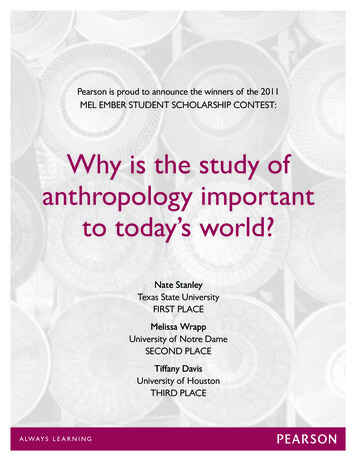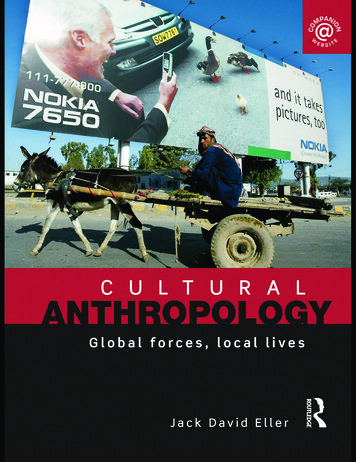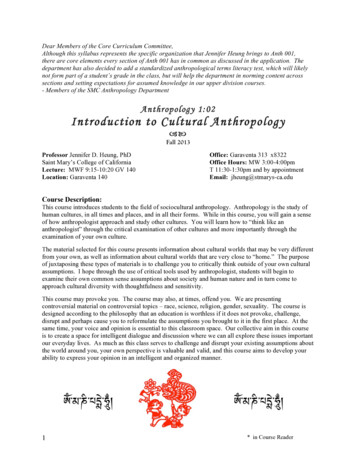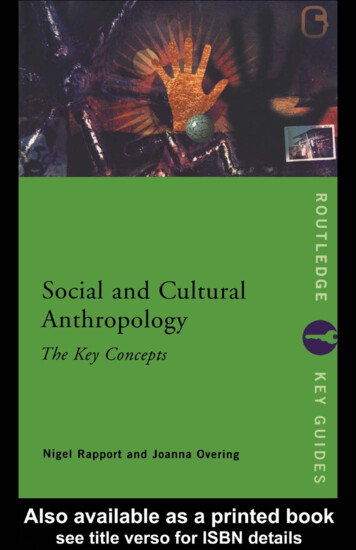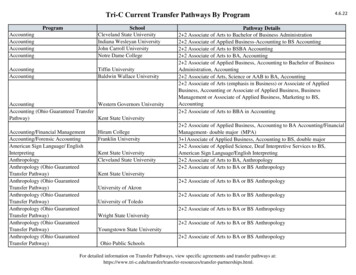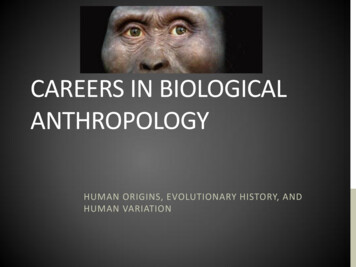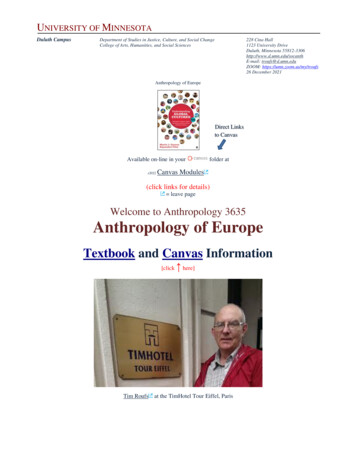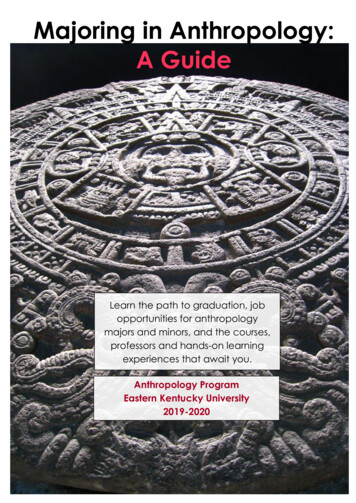
Transcription
Majoring in Anthropology:A GuideLearn the path to graduation, jobopportunities for anthropologymajors and minors, and the courses,professors and hands-on learningexperiences that await you.Anthropology ProgramEastern Kentucky University2019-2020
Welcome Student!Thank you for your interest in Eastern Kentucky University’s Anthropology Program.Anthropology takes a cross-cultural and deep-time perspective of humans. We examine humanbiological and cultural diversity, and its interaction with the environment. The sub-fields ofanthropology that investigate this vast human diversity in both the past and present, are: archaeologycultural anthropologybiological anthropologylinguistic anthropologyThe anthropology program at EKU offers a student-centered, high-quality, undergraduate degree withexposure to archaeology, biological anthropology and cultural anthropology.Anthropology is also a discipline that touches just about everything workforce-related. In the last fiveyears, we have had students advance to professional schools (medicine, public health, law, and nursing),and graduate programs (Anthropology, Sociology, Museum Studies, Organizational Psychology,Historic Preservation, Public Administration). Many majors go into contract archaeology, the zoo andconservation communities, health, and nutrition work; many others go into the business world, andsome pursue education and museum work. Other majors are applying their GIS and data training.What students do with their education is as diverse as the students themselves. We want our studentsto be highly prepared to compete with anyone, no matter what their interests and career paths.EKU Anthropology is devoted to helping develop and improve student skills. Our students take fieldschools in archaeology and primatology. Students experience culture in education abroad opportunities(in Spain, Denmark, Peru, and Madagascar) and in local communities. They apply what they learn inthe classroom to the world around them. These approaches have high impacts on student learning.In this guide, you will find information about: Requirements for the BA Major in AnthropologyRequirements for the Minors in Anthropology and ArchaeologyDescriptions of our coursesOpportunities to participate in study abroad, archaeology and primate field schools,and applied anthropology research.Anthropology ClubTo learn more about EKU Anthropology, please contact me directly at Benjamin.Freed@eku.edu or859-622-4387. Also check https://anthropology.eku.edu. I look forward to hearing from you soon!Sincerely,Benjamin Z. Freed, Ph.D.Assistant Professor of AnthropologyBenjamin.Freed@eku.eduCover Image: "National Museum of Anthropology #08" by SqueakyMarmot is licensed under CC BY-SA 2.01
The Path to Majoring in AnthropologyMajor Requirements: 33 hours (120 Total hours)REQUIRED COURSES:ANT 120: Introduction to Cultural Anthropology (fulfills General Education Element 5b)ANT 200: Archaeology and Human Culture (fulfills General Education Element 5a)ANT 201: Introduction to Biological Anthropology (fulfills General Education Element 4)ANT 330 American Indians (fulfills General Education Element 6)ANT 351W: Archaeology: Writing IntensiveANT 395: History and Theory of AnthropologyAND at least one course from each of the following three categories (18 hours total):ANT 321ANT 341ANT 357ANT 360ANT 439ANT 470ANT 471ANT 355ARCHAEOLOGYHistorical ArchaeologyNorth American ArchaeologyArchaeology and the LawMesoamerica before CortezPracticum in ArchaeologyField Methods in ArchaeologyArchaeological Materials AnalysisSelected Topics in ArchaeologyANT 311ANT 344ANT 377ANT 393ANT 375CULTURAL ANTHROPOLOGYAnthropology of ReligionApplied AnthropologyMedical AnthropologyKinship and MarriageSelected Topics in Cultural Anthropology, Food & CultureANT 306ANT 308ANT 370ANT 371ANT 380ANT 385ANT 365BIOLOGICAL ANTHROPOLOGYHuman EvolutionQuantitative Methods in AnthropologyPrimate ConservationPrimate Ecology and SocialityForensic AnthropologyHuman OsteologySelected Topics in Biological AnthropologyProfessors Ben Freed and Jon Endoninocelebrate with 2018 graduates.
The Path to Minoring in ArchaeologyREQUIRED COURSESANT 200 Archaeology and Human CultureANT 351W Archaeology Writing IntensiveAnd 12 hours of upper division archaeology electivesANT 321 Historical ArchaeologyANT 341 North American ArchaeologyANT 357 Archaeology and the LawANT 360 Mesoamerica before CortezANT 439 Practicum in ArchaeologyANT 470 Field Methods in ArchaeologyANT 471 Archaeological Materials AnalysisANT 355 Selected Topics in ArchaeologyStudents identify flakes during the2018 Archaeology Field School.The Path to Minoring in AnthropologyREQUIRED COURSESANT 120 Introduction to Cultural AnthropologyANT 200 Archaeology and Human CultureANT 201 Introduction to Biological AnthropologyAnd one upper division course in each of the following:ARCHAEOLOGYANT 321 Historical ArchaeologyANT 341 North American ArchaeologyANT 357 Archaeology and the LawANT 360 Mesoamerica before CortezANT 439 Practicum in ArchaeologyANT 470 Field Methods in ArchaeologyANT 471 Archaeological Materials AnalysisANT 355 Selected Topics in ArchaeologyCULTURAL ANTHROPOLOGYANT 311 Anthropology of ReligionANT 344 Applied AnthropologyANT 377 Medical AnthropologyANT 393 Kinship and MarriageANT 375 Selected Topics in Cultural AnthropologyBIOLOGICAL ANTHROPOLOGYANT 306 Human EvolutionANT 308 Quantitative Methods in AnthropologyANT 370 Primate ConservationANT 371 Primate Ecology and SocialityANT 380 Forensic AnthropologyANT 385 Human OsteologyANT 365 Selected Topics in Biological Anthropology3Professor Kelli Carmean leads a studyabroad trip to Barcelona, summer 2018.
Anthropology ClubAre you looking for opportunities to build new friendshipsor develop leadership and outreach skills?Join the Society of Student Anthropologists to participate inour Coffee Meet-Ups and our Student Lecture Series.Pictured: Our President and Treasurer update our publicmessage board in Roark ook.com/AnthroClubEKU/Careers in AnthropologyWhat skills can you learn?As an anthropology major, you will learnto Communicate effectively Problem solve Analyze qualitative and quantitativedata Work across cultures Understand human diversity Recognize and appreciate difference Work with ambiguity Cultivate your own and other’scuriosity Collect and understand large amountsof information Think through complex systems Interview research participants Observe ethnographic settings Take field notes Analyze and summarize findingsWhat career paths can you follow?At the national level, anthropology graduatestend to find employment as educators,managers, doctors, and lawyers, and many otherfields.Within the field of anthropology, graduates goon to be survey researchers, archivists, curators,and museum technicians, librarians, social andcommunity service managers, as well astechnicians at archaeology sites and labs incultural resource management.Some graduates also go on to work for privatebusiness as designers and ethnographers withcorporations who recognize our ability to domarket research beyond statistical and surveymethods.4Here are some of the titles graduates useto describe their employment: Education/OutreachCultural Resource ManagementHistoric PreservationMuseum Curation and Project DesignCommunity DevelopmentAdvocacy for Human RightsDesignInternational tHealthEnvironment and Natural ResourcesTourism/Heritage
Hands-On Learning in Anthropology @ EKUArchaeology Field SchoolOur anthropology program entered into an agreementwith the U.S. Forest Service in 2016 to conductarchaeology field schools in the Daniel Boone NationalForest for the next five years.Students enrolled in the Archaeology Field Schoolparticipate in these investigations.Dr. Endonino, who runs the field school, states, “Weare assisting the Forest Service in its mission ofmanaging and protecting our nation’s history andconducting the first systematic, scientific investigationsat these sites. By collecting and documenting valuableinformation from these irreplaceable and endangeredsites before it is lost forever, this work serves both thelearning objectives of our students and EKU’s regionalstewardship mission while simultaneously assisting theForest Service in the documentation and managementof historical properties within the forest. It’s a win-winfor everybody involved.”Students dig excavation pitsduring the Archaeology FieldSchool in the Daniel BooneNational Forest.Primate Field SchoolThe Primate Field School is a hands-on study of freeranging nonhuman primate ecology and socialorganization in a field setting.In Winter Term 2019 students in ANT 365 will observeprimates at the Lemur Conservation Foundation (LCF),Myakka City, Florida. Lemurs live in a naturalistichabitat where they travel, forage, and interact socially,much as they would in their native habitat. Students willbecome part of the team who study this population, inan on-going multidisciplinary research project.The course is specialized, and geared towards studentswho are interested in primatology, or who are interestedin exploring the methods and theories of this aspect ofanthropology. For Anthropology majors, the coursewill help show how this branch of physicalanthropology relates to Anthropology program courseofferings in physical anthropology, kinship, and huntergatherer studies. The course also relates to material inethology, ecology, and species-oriented courses inAnimal Studies and Biological Sciences.5Students observe lemurs in anaturalistic habitat for thePrimate Field School with Dr.Freed.
Hands-On Learning in Anthropology @ EKUStudy AbroadWe strongly encourage all of our anthropology majors topartake in one of our anthropology-faculty led StudyAbroad opportunities. Education Abroad is a high impactpractice because it provides a chance to explore distantplaces that many only read about, and also to push beyondone’s comfort zone. Such opportunities offer space forpersonal reflection, as well as directing one’s own learningthrough student-led projects such as “Ancient Rome andMe.”Lately, Dr. Carmean has been taking students to Peru(Archaeology of the Ancient Andean World), to Barcelona(Archaeology of Rome in Spain) and to Scandinavia (VikingArchaeology).Applied Anthropology ResearchIn our upper level cultural anthropology courses, weencourage students to pursue independent ethnographicresearch as part of their coursework. In appliedanthropology, students have conducted service learningprojects with the public library, Colonel’s Cupboard FoodPantry, YMCA, churches and other local non-profits.These projects can be further developed into directedstudies, where students pursue their topic of interest underthe supervision of one of our faculty members for coursecredit. To get experience with ethnographic research,consider taking Applied Anthropology (ANT 344) andMedical Anthropology (ANT 377).We also encourage students to work with our facultymembers on their research topics. For example, students areassisting Dr. Green with her study on the impact foodinsecurity has on students at EKU.6
Our Courses7ANT 120Introduction toCulturalAnthropologyANT 200Archaeologyand HumanCultureANT 201Introduction toBiologicalAnthropologyExplanation of culture and related concepts. Development ofgeneralizations concerning social, economic, political, and ritualorganization, based chiefly on comparative study of varioussocieties. Includes a brief survey of linguistics. Gen. Ed. VB,VC, or VII (SBS).Study of the evolution of human societies through time andover space. The course focuses on hunter-gatherer,horticultural, agrarian and industrial societies, and their changethrough time. Gen. Ed. VA, VC, or VII (SBS).General survey of the human biological species and itsevolution, emphasizing the study of genetics, osteology, primatebehavior and biology, fossil populations, and contemporaryhuman biological variation. Gen. Ed. E-4.ANT 306HumanEvolutionA detailed analysis of primate and human physical developmentemphasizing the fossil evidence of humankind’s evolution.ANT 321HistoricalArchaeologyANT 330AmericanIndiansThis course provides an introduction to the material culture ofNorth America’s recent past. Lecture is combined with handson exercises using historic artifacts and documentary sources.Explores the cultural diversity of American Indians byexamining their historical and contemporary lives. Focus oncultural similarities and differences of American Indian groupsliving in ecologically diverse areas. Gen Ed Element 6.ANT 341North AmericanArchaeologyANT tensiveANT 357Archaeologyand the LawANT 360MesoamericaBefore CortezA basic but comprehensive introduction to Native Americanarchaeology from the earliest evidence through EuropeanContact.Comprehensive survey of applied anthropology theories,methods, and approaches. Based on extensive cross-culturalcase materials, examines the historical, current, and potentialapplications of anthropological perspectives to social problems.A comprehensive introduction to archaeological goals,methods, practice and challenges. Data-based problem solving,critical thinking and writing are integral components of thiscourse.Survey of Federal legislation for the management of culturalresources, and the repatriation of human remains and othermaterials to descendant Native American tribes. Global heritageissues also addressed.The study of archaeological past, the colonial experience, andthe contemporary reality of the Indians of Mesoamerica,focusing primarily on the ancient Maya.
Our Courses8ANT 370PrimateConservationANT 371PrimateEcology andSocialityThe local human and biological impact of conservationprograms affecting primate communities throughout the world.Topics include forest fragmentation, historical perspectives onconservation, agroforestry, ecotourism, ethnography, anddisease.Ecological relationships within primate communities. Studentsexamine primate social structure, habitat use, diet, locomotion,seasonality, plant-primate interactions, and predator-preyrelationships.ANT 377MedicalAnthropologyExploration of health, healthcare, and healing crossculturally. Through medical anthropology theory and methods,apply critical perspectives to the health status of populations, thedistribution of health in societies, and health outcomes.ANT 380ForensicAnthropologyForensic osteology and dentistry; including demographicmethods, pathology, and practical methods of collecting humanphysical evidence; and the role of the expert witness.ANT 385HumanOsteologyAnalysis of individual skeletal remains, focusing on functionalanatomy and bone physiology, disease and injury, andnutrition. Includes introductions to bioarchaeology, forensicanthropology, and biocultural reconstruction.ANT 395History andTheory ofAnthropologyA capstone investigation of past and present practices andtheories used to interpret data from each of anthropology’s foursubdisciplines. Professionalism in anthropology also integrated.ANT 439Practicum inArchaeologyThis course pairs senior anthropology majors with professionalarchaeologists for on-the-job training. Practicum options mayinclude federal and state governments, private archaeologicalconsultants, and anthropology museums.ANT 470Field Methodsin ArchaeologyA hands-on study of archaeological field methods includingexcavation techniques as well as some laboratory analysis ofarchaeological remains.ANT 471ArchaeologicalMaterialsAnalysisFamiliarizes students with processing, analysis, andinterpretation of archaeological materials. This course has alaboratory component where students will work witharchaeological materials.ANT 490ANT 498IndependentStudy &Directed StudyInterested in an independent study on a topic of your own andyour professor’s interest? Consider asking one of the Anthrofaculty to do a Directed or Independent Study.
Who We AreDr. Kelli CarmeanFoundation ProfessorOffice: Keith 225Email: kelli.carmean@eku.eduPhone: 859-622-1366Interests: North American & Mesoamerican Archaeology PublicArchaeology Native America Study AbroadBooksDr. Jon EndoninoAssistant ProfessorOffice: Keith 230Email: jon.endonino@eku.eduPhone: 859-622-1650Interests: North American & Southeastern U.S. archaeology St. Johns River Valley & Atlantic coast ofFlorida Middle and Late Archaic periods Archaic mounds, monumentality & memory Lithictechnology & analysis experimental archaeology CRM/public archaeologySelected Publications The Quarry Cluster Approach to Chert Provenance: A Review ofthe Method with Examples from Early Florida Sites Examining Orange Period Vessel Forming Methods ThroughExperiment and Radiography: Implications for Chronology,Technology, and Function. The Thornhill Lake Archaeological Research Project: 2005-2008.9
Who We AreDr. Benjamin FreedProgram Coordinator and Assistant ProfessorOffice: Keith 226Email: benjamin.freed@eku.eduPhone: 859-622-4387Interests: Physical Anthropology Primate Ecology Conservation HumanEvolution Primate Evolution Science Education Lemurs Madagascar Quantitative MethodsSelected Publications Primates of the edge: An ethnoprimatological study of human andwildlife interaction bordering a Malagasy National Park Polyspecific associations of crowned lemurs and Sanford’s lemursin MadagascarDr. Amanda GreenAssistant ProfessorOffice: Keith 220Email: amanda.green@eku.eduPhone: 859-622-1646Interests: Cultural anthropology; applied anthropology; environmentalanthropology; anthropology of food; food activism; Indigenous sovereignty;Sámi and Circumpolar peoples; Sweden, Europe; food, farming andsustainability in U.S. higher ed.Selected Publications Indigenous Reflexivity and Resistance in Global Food Activism: The Case of SápmiReindeer Fat and the Taste of Place in Sámi Food ActivismFood for thought: How would an anthropologist study student food insecurity?”Food not Mines? Questions Regarding Sweden’s National Mining and Food Policies and Sámi RightsCarissa BrownAdministrative CoordinatorDepartment: Anthropology/Sociology/Social WorkOffice: 521 Lancaster AvenueEmail: carissa.brown@eku.eduPhone: 622-164410
Requirements for the Minors in Anthropology and Archaeology Descriptions of our courses Opportunities to participate in study abroad, archaeology and primate field schools, and applied anthropology research. Anthropology Club To learn more about EKU Anthropology, please contact me directly at Benjamin.Freed@eku.edu or 859-622-4387.
